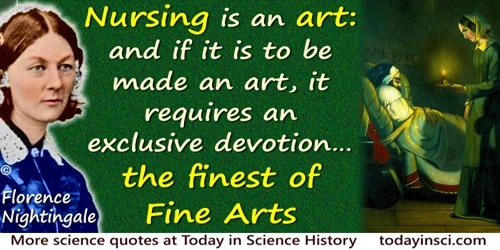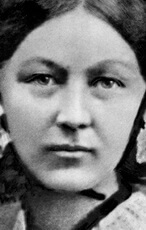- Community
-
Programs
- Schools
-
Careers
- RN Specialties
- Best RN Jobs and Salaries
- Aesthetic Nurse
- Nursing Informatics
- Nurse Case Manager
- NICU Nurse
- Forensic Nurse
- Labor and Delivery Nurse
- Psychiatric Nurse
- Pediatric Nurse
- Travel Nurse
- Telemetry Nurse
- Dermatology Nurse
- Nurse Practitioner
- Best NP Jobs and Salaries
- Family NP (FNP)
- Pediatric NP
- Neonatal NP
- Oncology NP
- Acute Care NP
- Aesthetic NP
- Women's Health NP
- Adult-Gerontology NP
- Orthopedic NP
- Emergency NP
- Psychiatric-Mental Health NP (PMHNP)
- APRN
- Nurse Educator
- Nurse Administrator
- Certified Nurse Midwife (CNM)
- Clinical Nurse Specialist (CNS)
- Certified Registered Nurse Anesthetist (CRNA)
- Resources
- Education



Florence Nightingale is famous for her pioneering nursing education, her development of statistical analysis and her improvements on methods of care delivery. She is also famous because she was "the woman with the lamp," a caring nurse who walked around late at night in the barracks, amongst the wounded soldiers, dispensing comfort and a big dose of healing therapy.
What in the world does Flo have to say to us today? In this world of EMRs, diagnostic testing, and multi-disciplined care, what do we has nurses uniquely offer to our patients? How can we continue to be outstanding patient advocates as well as thinking professionals who constantly look for ways to do things better? In this day of increasingly depersonalized care, how do we keep making a difference?
Nightingale was born to English aristocracy. She was wealthy and travelled widely but she rebelled at following the usual roles laid out for women of her time. Instead, following what she regarded as a divine call, she dedicated her life and considerable intellect to improving the care that soldiers received as they recuperated from war, especially during the Crimean War. She observed entirely new practices of hygiene and cleanliness-despite strong opposition. In addition to saving hundreds of lives, she is credited with using scientific process to change practice. She kept careful records and published statistical analyses of her work. A mathematical prodigy from an early age, she harnessed her mind and applied it well to practical, every day problems.
As professional nurses who seek to emulate Nightingale and others like her, we have a strong responsibility to continue to think clearly, to use our intelligence and training to continue to make strides in our work. What are some guiding principles we can apply?
Keep our eye on the ball
In athletics, players are admonished to focus on what they are doing and to selectively tune out anything besides the main event. As nurses, we too have to keep our attention focused on our patients, giving them the priority. With the fragmentation of patient care, we are often the only persons on the care team that have the big picture in mind. As team players, we need to do an excellent job of communicating the patient's story, of hearing what is said around the bedside, of connecting the dots related to the patient's care. I remember the elderly woman who came in with pneumonia. She was a very attractive older lady and in talking with her casually, I could not detect what the family later told me: although she could carry on a good casual conversation, her memory was simply "gone." This bit of information helped to guide the care team in sending her home with home health instead of to rehab because that was simply a better fit for her.
Don't let the EMR rule the day
With all the computer work that is required, there is often little time for face-to-face interaction and for that extra measure of comfort. Despite the limits of time, touch, attention and eye contact- all of that old fashioned "lady and the lamp" care- never cease to be critical. As professional nurses, we continue to hone our listening skills, to increase our ability to be empathetic and to use our scientific knowledge to help our patients. I remember when I had a family member in the hospital and the nurse came in to give her medication. She did what she needed to do and then-she sat down. I mean, she took a seat and sat down! She only sat for about a minute, but it was long enough to make an impression. Her act said to us: "I am with you. I can't fix it, but I want to help by being here." We have never forgotten that.
Pioneer something
Back in the 1850's when Flo was laying the groundwork for modern nursing, there was plenty that needed fixing. Nowadays, we all hope that we have made a little progress in terms of germ theory and modern application of those scientific discoveries. But the truth is, there is always room for improvement. We all make mistakes. We begin to see the patient as a collection of lab results and diagnostic tests, and we forget to listen to some of what they are telling us. From improvements in hand washing to basic skin care to catheter care to wound healing, there is a constant stream of new areas to be explored, documented, changed. In recent years we have seen dramatic improvements in lives saved because of cardiac and stroke protocols, Foley catheter care and discontinuance, CHF follow up, etc. As medical care has progressed, we have gone from innovative and truly astounding developments in transplantation and stenting to a point where we are now looking in the rear view mirror and wondering if we need a more comprehensive approach to death and dying-truly a new frontier awaits!
Marianne Williamson wrote, "And as we let our own light shine, we unconsciously give other people permission to do the same. As we are liberated from our own fear, our presence automatically liberates others." As professionals who seek to spread the light of good care and of thorough and useful knowledge, we identify with Williamson's thoughts. Florence Nightingale got us started off right, now it's up to us to not let that light go out but to instead, keep carrying it and sharing it.
Joy Eastridge
About jeastridge, BSN, RN
Joy has been a nurse for 35 years, practicing in a variety of settings. Currently, she is a Faith Community Nurse. She enjoys her grandchildren, cooking for crowds and taking long walks.
Share this post
Share on other sites